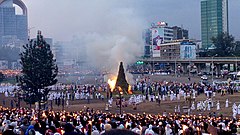Meskel
| Meskel | |
|---|---|
 Meskel celebration atMeskel Square,Addis Ababa(2016) | |
| Observed by | |
| Significance | Commemorates theFeast of the Crossand the discovery of theTrue Crossby theRomanEmpressSaint Helena of Constantinoplein the fourth century. |
| Celebrations | |
| Date |
|
| 2024 date | 27 September |
| Frequency | Annual |
Meskel(Ge'ez:መስቀል,romanized:Mesk’el) is anEthiopianandEritrean Orthodox Tewahedo Churchholiday that commemorates the discovery of theTrue Crossby theRomanEmpress Saint Helena of Constantinoplein the fourth century. Meskel is celebrated byOriental Orthodoxmembers of theEthiopian Orthodox Tewahedo Church,theEritrean Orthodox Tewahedo Church,and to a lesser extentRoman Catholicmembers of theEthiopian Catholic Church,theEritrean Catholic Church,and amongProtestantmembers ofP'ent'ay - Ethiopian-Eritrean Evangelicalism(includingPentecostal,Lutheran,Baptist,Mennonite,and otherEvangelicalchurches). It is a localized version of theFeast of the Crossand occurs on the 17 Meskerem in theEthiopian calendar(27 September,Gregorian calendar,or on 28 September inleap years).[1]"Meskel" (or "Meskal" or "Mesqel", there are various ways totransliteratefrom Ge'ez to Latin script) isAmharicfor "cross".
The feast is held inMeskel Square,named after the festival, in the capital city ofAddis Ababa.Religious and civil leaders preside over the celebration, and public figures give speeches and reference biblical themes and stories. Many Ethiopians who live in cities return to their home villages to celebrate the national event. When darkness falls, the Demera is burned.[2]UNESCOinscribed Meskel in 2013 on the RepresentativeList of the Intangible Cultural Heritage of Humanity.[3]
Overview
[edit]The Meskel celebration includes the burning of a large bonfire, or Demera, based on the belief thatQueen Elenihad a revelation in a dream. She was told that she should make a bonfire and that the smoke would show her where the True Cross was buried. So she ordered the people ofJerusalemto bring wood and make a huge pile. After addingfrankincense,the bonfire was lit and the smoke rose high up to the sky and returned to the ground, exactly to the spot where the Cross had been buried.[4]
According to local traditions, this Demera-procession takes place in the early evening the day before Meskel or on the day itself. The firewood is decorated withdaisiesprior to the celebration. Charcoal from the remains of the fire is afterwards collected and used by the faithful to mark their foreheads with the shape of a cross (compareAsh Wednesday).Edward Ullendorffrecords a number of beliefs of the meaning of Demera, with some believing that it "marks the ultimate act in the cancellation of sins, while others hold that the direction of the smoke and the final collapse of the heap indicate the course of future events – just as the cloud of smoke the Lord raised over theTabernacleoffered guidance to the children of Israel (Exod.40:34–38). "[5]

One explanation for the high rank this festival has in the church calendar is that it is believed that a part of the true Cross has been brought to Ethiopia from Egypt. It is said to be kept atAmba Geshen,which itself has a cross-shaped plan.[citation needed]
According to the Ethiopian Orthodox Church, the discovery of the True Cross is traditionally believed to have been in March, but Meskel was moved to September to avoid holding a festival duringLent,and because the church commemorating the True Cross in Jerusalem was dedicated during September.[6]Ullendorff speculates that Meskel replaced an older festival, with pagan and Hebraic associations, which he believes received its Christian sanction around the reign of EmperorAmda Seyonin the fourteenth century. "The most ancient meaning of these feasts – as was also the case in Israel – was no doubt seasonal: the month of Maskaram marked the end of the rains, the resumption of work, and the reopening of communications."[5]
Notes
[edit]- ^Rough Guides(2015). "Festivals".The Rough Guide to Ethiopia.Rough Guide to...ISBN9780241181850.
- ^Thomas M Landy,"Meskel",Catholics & Culturesupdated June 19, 2015
- ^"Commemoration feast of the finding of the True Holy Cross of Christ".unesco.org.Retrieved2015-12-23.
- ^"Walta Information Center".Meskel Being Celebrated Across The Nation.Archived fromthe originalon March 19, 2006.RetrievedSeptember 14,2005.
- ^abUllendorff, p. 114
- ^Amanuel Sahle."The Byzantine Origin of Meskel".Shaebia.org.RetrievedSeptember 14,2005.
References
[edit]- Ullendorff Edward (1968)Ethiopia and the Bible,Schweich lecturesseries, Oxford University Press for the British Academy,ISBN0-19-726076-4
External links
[edit]- Festival and Holidayson the website of the Embassy of the Federal Democratic Republic of Ethiopia in the United Kingdom, with a section on "Meskel – The Finding of the True Cross"
